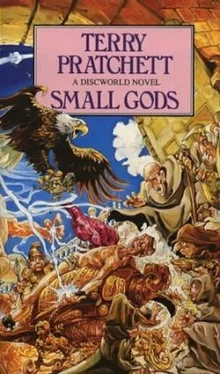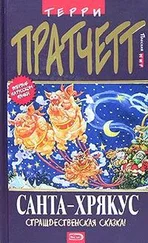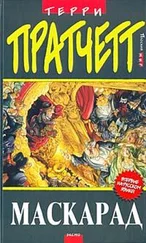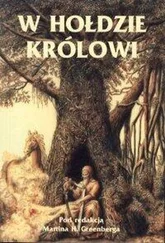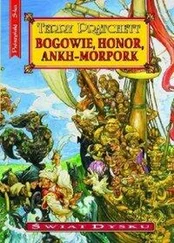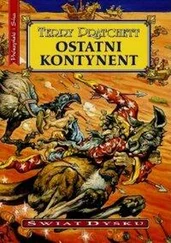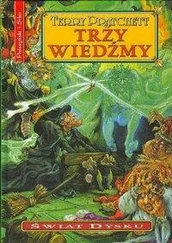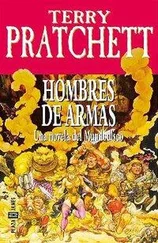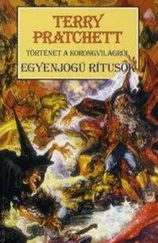Terry Pratchett - Small Gods
Здесь есть возможность читать онлайн «Terry Pratchett - Small Gods» весь текст электронной книги совершенно бесплатно (целиком полную версию без сокращений). В некоторых случаях можно слушать аудио, скачать через торрент в формате fb2 и присутствует краткое содержание. Жанр: Юмористическая фантастика, на английском языке. Описание произведения, (предисловие) а так же отзывы посетителей доступны на портале библиотеки ЛибКат.
- Название:Small Gods
- Автор:
- Жанр:
- Год:неизвестен
- ISBN:нет данных
- Рейтинг книги:4 / 5. Голосов: 1
-
Избранное:Добавить в избранное
- Отзывы:
-
Ваша оценка:
- 80
- 1
- 2
- 3
- 4
- 5
Small Gods: краткое содержание, описание и аннотация
Предлагаем к чтению аннотацию, описание, краткое содержание или предисловие (зависит от того, что написал сам автор книги «Small Gods»). Если вы не нашли необходимую информацию о книге — напишите в комментариях, мы постараемся отыскать её.
Small Gods — читать онлайн бесплатно полную книгу (весь текст) целиком
Ниже представлен текст книги, разбитый по страницам. Система сохранения места последней прочитанной страницы, позволяет с удобством читать онлайн бесплатно книгу «Small Gods», без необходимости каждый раз заново искать на чём Вы остановились. Поставьте закладку, и сможете в любой момент перейти на страницу, на которой закончили чтение.
Интервал:
Закладка:
If she had been born a man, Omnianism would have found its 8th Prophet rather earlier than expected. As it was, she organized the temple-cleaning, statue-polishing, and stoning-of-suspected-adulteresses rotas with a terrible efficiency.
So Brutha grew up in the sure and certain knowledge of the Great God Om. Brutha grew up knowing that Om's eyes were on him all the time, especially in places like the privy, and that demons assailed him on all sides and were only kept at bay by the strength of his belief and the weight of grandmother's cane, which was kept behind the door on those rare occasions when it was not being used. He could recite every verse in all seven Books of the Prophets, and every single Precept. He knew all the Laws and the Songs. Especially the Laws.
The Omnians were a God-fearing people.
They had a great deal to fear.
Vorbis's room was in the upper Citadel, which was unusual for a mere deacon. He hadn't asked for it. He seldom had to ask for anything. Destiny has a way of marking her own.
He also got visited by some of the most powerful men in the Church's hierarchy.
Not, of course, the six Archpriests or the Cenobiarch himself. They weren't that important. They were merely at the top. The people who really run organizations are usually found several levels down, where it's still possible to get things done.
People liked to be friends with Vorbis, mainly because of the aforesaid mental field which suggested to them, in the subtlest of ways, that they didn't want to be his enemy.
Two of them were sitting down with him now. They were General Iam Fri'it, who whatever the official records might suggest was the man who ran most of the Divine Legion, and Bishop Drunah, secretary to the Congress of Iams. People might not think that was much of a position of power, but then they'd never been minutes secretary to a meeting of slightly deaf old men.
Neither man was in fact there. They were not talking to Vorbis. It was one of those kinds of meeting. Lots of people didn't talk to Vorbis, and went out of their way not have meetings with him. Some of the abbots from the distant monasteries had recently been summoned to the Citadel, traveling secretly for up to a week across tortuous terrain, just so they definitely wouldn't join the shadowy figures visiting Vorbis's room. In the last few months, Vorbis had apparently had about as many visitors as the Man in the Iron Mask.
Nor were they talking. But if they had been there, and if they had been having a conversation, it would have gone like this:
"And now," said Vorbis, "the matter of Ephebe."
Bishop Drunah shrugged [3].
"Of no consequence, they say. No threat."
The two men looked at Vorbis, a man who never raised his voice. It was very hard to tell what Vorbis was thinking, often even after he had told you.
"Really? Is this what we've come to?" he said. "No threat? After what they did to poor Brother Murduck? The insults to Om? This must not pass. What is proposed to be done?"
"No more fighting," said Fri'it. "They fight like madmen. No. We've lost too many already."
"They have strong gods," said Drunah.
"They have better bows," said Fri'it.
"There is no God but Om," said Vorbis. "What the Ephebians believe they worship are nothing but djinns and demons. If it can be called worship. Have you seen this?"
He pushed forward a scroll of paper.
"What is it?" said Fri'it cautiously.
"A lie. A history that does not exist and never existed . . . the . . . the things . . ." Vorbis hesitated, trying to remember a word that had long since fallen into disuse, ". . . like the . . . tales told to children, who are too young . . . words for people to say . . . the . . ."
"Oh. A play," said Fri'it. Vorbis's gaze nailed him to the wall.
"You know of these things?"
"I-when I traveled in Klatch once-” Fri'it stuttered. He visibly pulled himself together. He had commanded one hundred thousand men in battle. He didn't deserve this.
He found he didn't dare look at Vorbis's expression.
"They dance dances," he said limply. "On their holy days. The women have bells on their . . . And sing songs. All about the early days of the worlds, when the gods-”
He faded. "It was disgusting," he said. He clicked his knuckles, a habit of his whenever he was worried.
"This one has their gods in it," said Vorbis. "Men in masks. Can you believe that? They have a god of wine. A drunken old man! And people say Ephebe is no threat! And this-”
He tossed another, thicker scroll on to the table.
"This is far worse. For while they worship false gods in error, their error is in their choice of gods, not in their worship. But this-”
Drunah gave it a cautious examination.
"I believe there are other copies, even in the Citadel," said Vorbis. "This one belonged to Sasho. I believe you recommended him to my service, Fri'it?"
"He always struck me as an intelligent and keen young man," said the general.
"But disloyal," said Vorbis, "and now receiving his just reward. It is only to be regretted that he has not been induced to give us the names of his fellow heretics."
Fri'it fought against the sudden rush of relief. His eyes met those of Vorbis.
Drunah broke the silence.
"De Chelonian Mobile," he said aloud. " `The Turtle Moves.' What does that mean?"
"Even telling you could put your soul at risk of a thousand years in hell," said Vorbis. His eyes had not left Fri'it, who was now staring fixedly at the wall.
"I think it is a risk we might carefully take," said Drunah.
Vorbis shrugged. "The writer claims that the world . . . travels through the void on the back of four huge elephants," he said.
Drunah's mouth dropped open.
"On the back?" he said.
"It is claimed," said Vorbis, still watching Fri'it.
"What do they stand on?"
"The writer says they stand on the shell of an enormous turtle," said Vorbis.
Drunah grinned nervously.
"And what does that stand on?" he said.
"I see no point in speculating as to what it stands on," snapped Vorbis, "since it does not exist!"
"Of course, of course," said Drunah quickly. "It was only idle curiosity."
"Most curiosity is," said Vorbis. "It leads the mind into speculative ways. Yet the man who wrote this walks around free, in Ephebe, now. "
Drunah glanced at the scroll.
"He says here he went on a ship that sailed to an island on the edge and he looked over and-”
"Lies," said Vorbis evenly. "And it would make no difference even if they were not lies. Truth lies within, not without. In the words of the Great God Om, as delivered through his chosen prophets. Our eyes may deceive us, but our God never will."
"But-”
Vorbis looked at Fri'it. The general was sweating.
"Yes?" he said.
"Well . . . Ephebe. A place where madmen have mad ideas. Everyone knows that. Maybe the wisest course is leave them to stew in their folly?"
Vorbis shook his head. "Unfortunately, wild and unstable ideas have a disturbing tendency to move around and take hold."
Fri'it had to admit that this was true. He knew from experience that true and obvious ideas, such as the ineffable wisdom and judgment of the Great God Om, seemed so obscure to many people that you actually had to kill them before they saw the error of their ways, whereas dangerous and nebulous and wrongheaded notions often had such an attraction for some people that they would-he rubbed a scar thoughtfully-hide up in the mountains and throw rocks at you until you starved them out. They'd prefer to die rather than see sense. Fri'it had seen sense at an early age. He'd seen it was sense not to die.
"What do you propose?" he said.
"The Council want to parley with Ephebe," said Drunah. "You know I have to organize a deputation to leave tomorrow."
Читать дальшеИнтервал:
Закладка:
Похожие книги на «Small Gods»
Представляем Вашему вниманию похожие книги на «Small Gods» списком для выбора. Мы отобрали схожую по названию и смыслу литературу в надежде предоставить читателям больше вариантов отыскать новые, интересные, ещё непрочитанные произведения.
Обсуждение, отзывы о книге «Small Gods» и просто собственные мнения читателей. Оставьте ваши комментарии, напишите, что Вы думаете о произведении, его смысле или главных героях. Укажите что конкретно понравилось, а что нет, и почему Вы так считаете.
